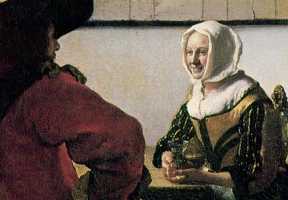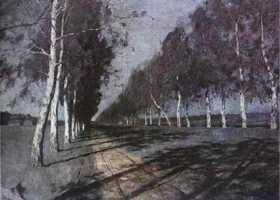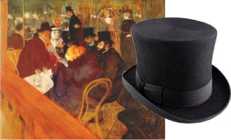| Il portait bien son nom de bataille, l'abbé Marignan. C'était un grand prêtre maigre, fanatique, d'âme toujours exaltée, mais droite. Toutes ses croyances étaient fixes, sans jamais d'oscillations. Il s'imaginait sincèrement connaître son Dieu, pénétrer ses desseins, ses volontés, ses intentions. |  |
The abbé Marignan was named after the battle of Marignano, and well named. He was a tall, lean priest, fanatically zealous but upright. Every aspect of his belief was fixed, and never wavered in the slightest. He believed sincerely that he knew his God and understood his will and intentions. |
| Quand il se promenait à grands pas dans l'allée de son petit presbytère de campagne, quelquefois une interrogation se dressait dans son esprit : «Pourquoi Dieu a-t-il fait cela ? » Et il cherchait obstinément, prenant en sa pensée la place de Dieu, et il trouvait presque toujours. Ce n'est pas lui qui eût murmuré dans un élan de pieuse humilité : «Seigneur, vos desseins sont impénétrables!» Il se disait : «Je suis le serviteur de Dieu, je dois connaître ses raisons d'agir, et les deviner si je ne les connais pas.» |
When he strode along the path of his little country presbytery, he would sometimes ask himself “Why has God done this?” He would search doggedly for an answer, looking at things from God’s point of view, and he nearly always found one. It was not his way to murmur in a rush of pious humility “Oh Lord, you work in a mysterious way!” He said to himself “As a servant of the Lord, I must know the reasons for his actions, or guess them if I don't know”. |
|
| Tout lui paraissait créé dans la nature avec une logique absolue et admirable. Les «Pourquoi» et les «Parce que» se balançaient toujours. Les aurores étaient faites pour rendre joyeux les réveils, les jours pour mûrir les moissons, les pluies pour les arroser, les soirs pour préparer au sommeil et les nuits sombres pour dormir. |
Everything in nature appeared to him to have been created with a logic as inflexible as it was admirable. A “why” was always balanced by a “because”. Dawn had been made so that waking would be a joy; the days to ripen the crops; the rain to water them; the evenings for making ready to rest; and the darkness of night for sleep. |
|
Les quatre saisons correspondaient parfaitement à tous les besoins de l'agriculture ; et jamais le soupçon n'aurait pu venir au prêtre que la nature n'a point d'intentions et que tout ce qui vit s'est plié, au contraire, aux dures nécessités des époques, des climats et de la matière. |
The four seasons were a perfect match for the needs of farmers, and it never occurred to him that nature has no plan and that, in fact, all life is made to fit the harsh necessities of seasons, climates and solid matter. |
|
| Mais il haïssait la femme, il la haïssait inconsciemment, et la méprisait par instinct. Il répétait souvent la parole du Christ : «Femme, qu'y a-t-il de commun entre vous et moi ? » et il ajoutait : «On disait que Dieu lui-même se sentait mécontent de cette œuvre-là.» La femme était bien pour lui l'enfant douze fois impure dont parle le poète. Elle était le tentateur qui avait entraîné le premier homme et qui continuait toujours son œuvre de damnation, l'être faible, dangereux, mystérieusement troublant. Et plus encore que leur corps de perdition, il haïssait leur âme aimante. | But he hated women, he hated them subconsciously and despised them by instinct. He often repeated the words of Christ “Woman, what have I to do with you?” and added “Surely even God must feel that woman is not on the same level as his other works”. Women were, for him, the child twelve times impure of whom the poet speaks. Woman was the tempter who had led astray the first man and who still continued her work of damnation. Women were weak, dangerous and obscurely troubling. Even more than woman's sinful body, he hated her loving heart. | |
Souvent il avait senti leur tendresse attachée à lui et, bien qu'il se sût inattaquable, il s'exaspérait de ce besoin d'aimer qui frémissait toujours en elles. Dieu, à son avis, n'avait créé la femme que pour tenter l'homme et l'éprouver. Il ne fallait approcher d'elle qu'avec des précautions défensives, et les craintes qu'on a des pièges. Elle était, en effet, toute pareille à un piège avec ses bras tendus et ses lèvres ouvertes vers l'homme. |
He had often felt himself a target for their affections, and though he was anything but vulnerable he was exasperated by the need to love that constantly fluttered within them. God, in his opinion, had created woman only to test man through temptation. One could not go near a woman without taking defensive precautions and being alert for a trap. Woman's open arms and lips were, in fact, just like a trap. | |
| Il n'avait d'indulgence que pour les religieuses que leur voeu rendait inoffensives ; mais il les traitait durement quand même, parce qu'il la sentait toujours vivante au fond de leur coeur enchaîné, de leur coeur humilié, cette éternelle tendresse qui venait encore à lui, bien qu'il fût un prêtre. | He was a little more lenient towards nuns, whose vows rendered them harmless; but even nuns he treated harshly because he was always aware of the everlasting tenderness deep in their fettered hearts, directed at him even though he was a priest. | |
| Il la sentait dans leurs regards plus mouillés de piété que les regards des moines, dans leurs extases où leur sexe se mêlait, dans leurs élans d'amour vers le Christ, qui l'indignaient parce que c'était de l'amour de femme, de l'amour charnel ; il la sentait, cette tendresse maudite, dans leur docilité même, dans la douceur de leur voix en lui parlant, dans leurs yeux baissés, et dans leurs larmes résignées quand il les reprenait avec rudesse. | He saw it in their expressions, more moistly pious than those of monks; in their religious ecstasies which partook of their sex; and in their outpourings of love for Christ, which he found an affront because it was woman’s love, fleshly love. He felt it, this cursed tenderness, in their very docility, in the softness of their voices, in their lowered eyes, and in their resigned tears when he reproved them bluntly. | |
| Et il secouait sa soutane en sortant des portes du couvent, et il s'en allait en allongeant les jambes comme s'il avait fui devant un danger. | He would shake out the skirts of his cassock as he left the gates of the convent, striding away as if fleeing from danger. | |
| Il avait une nièce qui vivait avec sa mère dans une petite maison voisine. Il s'acharnait à en faire une soeur de charité. Elle était jolie, écervelée et moqueuse. Quand l'abbé sermonnait, elle riait ; et quand il se fâchait contre elle, elle l'embrassait avec véhémence, le serrant contre son coeur, tandis qu'il cherchait involontairement à se dégager de cette étreinte qui lui faisait goûter cependant une joie douce, éveillant au fond de lui cette sensation de paternité qui sommeille en tout homme. | He had a niece who lived with her mother in a small house next to his own. He was determined to make her a Sister of Charity. She was pretty, featherbrained and mocking. When the abbé lectured her, she laughed; and when he became angry she would hug him hard, holding him against her breast while he tried involuntarily to get free from the embrace, although it made him feel a sweet pleasure and awoke deep within him the paternal feeling that slumbers in every man. |
 |
| Souvent il lui parlait de Dieu, de son Dieu, en marchant à côté d'elle par les chemins des champs. Elle ne l'écoutait guère et regardait le ciel, les herbes, les fleurs, avec un bonheur de vivre qui se voyait dans ses yeux. Quelquefois elle s'élançait pour attraper une bête volante, et s'écriait en la rapportant : «Regarde, mon oncle, comme elle est jolie ; j'ai envie de l'embrasser.» | Often he spoke to her of God, of his God, while they walked together along country tracks. She scarcely listened, but looked at the sky, the grass and the flowers, with the joy of life shining in her eyes. Sometimes she would rush to catch some flying creature, crying out as she brought it to him “Look, uncle, how pretty it is, it makes me want to hug it”. | |
| Et ce besoin d'embrasser des mouches ou des grains de lilas inquiétait, irritait, soulevait le prêtre, qui retrouvait encore là cette indéracinable tendresse qui germe toujours au coeur des femmes. | And this need to hug insects or lilac seeds worried, annoyed and disturbed the priest, who saw again the ineradicable tenderness within the hearts of women. | |
| Puis, voilà qu'un jour l'épouse du sacristain, qui faisait le ménage de l'abbé Marignan, lui apprit avec précaution que sa nièce avait un amoureux. Il en ressentit une émotion effroyable, et il demeura suffoqué, avec du savon plein la figure, car il était en train de se raser. | Then one day the wife of the sacristan, who did the abbé Marignan’s housework, cautiously told him that his niece had a lover. A terrible blast of emotion left him winded, his face still covered with soap because he was trying to shave. | |
| Quand il se retrouva en état de réfléchir et de parler, il s'écria : «Ce n'est pas vrai, vous mentez, Mélanie !» Mais la paysanne posa la main sur son coeur : «Que notre Seigneur me juge si je mens, monsieur le curé. J'vous dis qu'elle y va tous les soirs sitôt qu' votre soeur est couchée. Ils se r'trouvent le long de la rivière. Vous n'avez qu'à y aller voir entre dix heures et minuit.» | When he had recovered enough to think and speak, he cried out “It’s not true, you’re lying, Melanie!” But the peasant woman put her hand on her heart: “May the Lord judge me if I am lying, Monsieur le Curé. I tell you she goes to him every evening as soon as your sister is asleep. They meet by the river. You can see for yourself, just go there between ten o’clock and midnight”. | |
| Il cessa de se gratter le menton, et il se mit à marcher violemment, comme il faisait toujours en ses heures de grave méditation. Quand il voulut recommencer à se barbifier, il se coupa trois fois depuis le nez jusqu'à l'oreille. | He stopped scraping his chin and started to pace up and down as he always did when thinking deeply. When he went on with his shave, he cut himself three times between nose and ear. | |
Tout le jour, il demeura muet, gonflé d'indignation et de colère. A sa fureur de prêtre, devant l'invincible amour, s'ajoutait une exaspération de père moral, de tuteur, de chargé d'âme, trompé, volé, joué par une enfant ; cette suffocation égoïste des parents à qui leur fille annonce qu'elle a fait, sans eux et malgré eux, choix d'un époux. |
All day he was silent, filled with indignation and anger. As a priest confronted by the invincibility of love he was angry enough, but as a moral guardian and tutor who had been tricked and taken for a ride by a child, he was simply exasperated. He had the self-centred choking feeling of a father to whom a daughter has just announced that, without him and despite him, she has chosen a husband. | |
| Après son dîner, il essaya de lire un peu, mais il ne put y parvenir ; et il s'exaspérait de plus en plus. Quand dix heures sonnèrent, il prit sa canne, un formidable bâton de chêne dont il se servait toujours en ses courses nocturnes, quand il allait voir quelque malade. Et il regarda en souriant l'énorme gourdin qu'il faisait tourner, dans sa poigne solide de campagnard, en des moulinets menaçants. Puis, soudain, il le leva et, grinçant des dents, l'abattit sur une chaise dont le dossier fendu tomba sur le plancher. | After dinner he tried to read a little but could not, and he became more and more irritable. When ten o’clock struck he took his walking stick, a formidable piece of oak that he always took on night visits when he went out to visit some invalid. He smiled as he grasped the huge club in his hefty countryman’s fist and swung it in menacing circles. Then suddenly he raised it, gritted his teeth and brought it crashing down on a chair, splitting the backrest which fell to the floor. | |
| Et il ouvrit sa porte pour sortir ; mais il s'arrêta sur le seuil, surpris par une splendeur de clair de lune telle qu'on n'en voyait presque jamais. |  |
He opened the door to go out, but he paused on the threshold, surprised by moonlight more splendid than almost any he had seen before. |
| Et comme il était doué d'un esprit exalté, un de ces esprits que devaient avoir les Pères de l'Église, ces poètes rêveurs, il se sentit soudain distrait, ému par la grandiose et sereine beauté de la nuit pâle. Dans son petit, jardin, tout baigné de douce lumière, ses arbres fruitiers, rangés en ligne, dessinaient en ombre sur l'allée leurs grêles membres de bois à peine vêtus de verdure ; tandis que le chèvrefeuille géant, grimpé sur le mur de sa maison, exhalait des souffles délicieux et comme sucrés, faisait flotter dans le soir tiède et clair une espèce d'âme parfumée. |
And as he had an emotional nature, like the Fathers of the Church, those poetic dreamers, he was suddenly distracted from his purpose. He was moved by the great serenity and beauty of the night. In his little garden, bathed in gentle light, the rows of fruit trees traced the shapes of their frail branches, lightly clad in leaves, in shadows on the path; and from the giant honeysuckle that climbed the wall of the house came wafts of delicious sweetness, filling the warm clear night with a kind of perfumed soul. | |
| Il se mit à respirer longuement, buvant de l'air comme les ivrognes boivent du vin, et il allait à pas lents, ravi, émerveille, oubliant presque sa nièce. | He breathed deeply, drinking in the air as a drunkard drinks wine, and walked on with slow paces, rapt, marvelling, almost forgetting his niece. |
 |
| Dès qu'il fut dans la campagne, il s'arrêta pour contempler toute la plaine inondée de cette lueur caressante, noyée dans ce charme tendre et languissant des nuits sereines. Les crapauds à tout instant jetaient par l'espace leur note courte et métallique, et des rossignols lointains mêlaient leur musique égrenée qui fait rêver sans faire penser, leur musique légère et vibrante, faite pour les baisers, à la séduction du clair de lune. | Once past his garden he stopped to contemplate the plain, which was flooded with a caressing light as if drowning in the tender, languishing charm of calm nights. Toads constantly gave their short, metallic note. Further off, nightingales uttered their trickle of notes, that send the listener into a dream without thought, their music light and vibrant, made for kisses, for the seduction of moonlight. |
|
L'abbé se remit à marcher, le coeur défaillant, sans qu'il sût pourquoi. Il se sentait comme affaibli, épuisé tout à coup ; il avait une envie de s'asseoir, de rester là, de contempler, d'admirer Dieu dans son œuvre. Là-bas, suivant les ondulations de la petite rivière, une grande ligne de peupliers serpentait. Une buée fine, une vapeur blanche que les rayons de lune traversaient, argentaient, rendaient luisante, restait suspendue autour et au-dessus des berges, enveloppait tout le cours tortueux de l'eau d'une sorte de ouate légère et transparente. |
The abbé started walking again, his heart failing within him although he knew not why. He suddenly felt weakened, exhausted. He wanted to sit down, to stay where he was, to contemplate, to admire God in his works. In the distance, following the bends of the little river, meandered a great line of poplars. A fine mist of white vapour was pierced, silvered and made to glow by the moon’s rays. The mist hung around and above the banks, wrapping the whole winding course of the water in a sort of light, transparent cotton wool. |
 |
| Le prêtre encore une fois s'arrêta, pénétré jusqu'au fond de l'âme par un attendrissement grandissant, irrésistible. Et un doute, une inquiétude vague l'envahissait ; il sentait naître en lui une de ces interrogations qu'il se posait parfois. Pourquoi Dieu avait-il fait cela ? | The priest stopped again. The depths of his soul were flooded by a rising tide of tenderness, irresistible, and by a doubt, a vague worry. There arose within him one of those questions he sometimes put to himself. Why had God made this? | |
| Puisque la nuit est destinée au sommeil, à l'inconscience, au repos, à l'oubli de tout, pourquoi la rendre plus charmante que le jour, plus douce que les aurores et que les soirs, et pourquoi cet astre lent et séduisant, plus poétique que le soleil et qui semble destiné, tant il est discret, à éclairer des choses trop délicates et mystérieuses pour la grande lumière, s'en venait-il faire si transparentes les ténèbres ? | Since the night is intended for sleep, for unconsciousness, for rest and for forgetfulness, why make it more delightful than the day, sweeter than dawn or evening? And as for this slow, seductive orb, more poetic than the sun and so discreet that it seems destined to illuminate things too delicate and mysterious for daylight, why should it make the shadows so transparent? |
|
Pourquoi le plus habile des oiseaux chanteurs ne se reposait-il pas comme les autres et se mettait-il à vocaliser dans l'ombre troublante ? Pourquoi ce demi-voile jeté sur le monde ? Pourquoi ces frissons de coeur, cette émotion de l'âme, cet alanguissement de la chair ? Pourquoi ce déploiement de séductions que les hommes ne voyaient point, puisqu'ils étaient couchés en leurs lits ? A qui étaient destinés ce spectacle sublime, cette abondance de poésie jetée du ciel sur la terre ? Et l'abbé ne comprenait point. |
Why does the greatest songbird of all not sleep like the others but sets itself to sing in the unsettling darkness? Why should this half-veil be cast over the world? Why this trembling of the heart, this emotion in the soul, this languor of the body? Why should seductions that men never see, because they are asleep in their beds, be laid out like this? For whom is this sublime spectacle intended, this abundance of poetry cast from Heaven upon the earth? The abbé could not understand it. |
|
| Mais voilà que là-bas, sur le bord de la prairie, sous la voûte des arbres trempés de brume luisante, deux ombres apparurent qui marchaient côte à côte. L'homme était plus grand et tenait par le cou son amie, et, de temps en temps, l'embrassait sur le front. Ils animèrent tout à coup ce paysage immobile qui les enveloppait comme un cadre divin fait pour eux. |
But out there, at the edge of the meadow, under a vault of trees dipped in shining mist, there appeared two shadows walking side by side. |
|
| Ils semblaient, tous deux, un seul être, l'être à qui était destinée cette nuit calme et silencieuse ; et ils s'en venaient vers le prêtre comme une réponse vivante, la réponse que son Maître jetait à son interrogation. Il restait debout, le coeur battant, bouleversé, et il croyait voir quelque chose de biblique, comme les amours de Ruth et de Booz, l'accomplissement d'une volonté du Seigneur dans un de ces grands décors dont parlent les livres saints. En sa tête se mirent à bourdonner les versets du Cantique des Cantiques, les cris d'ardeur, les appels des corps, toute la chaude poésie de ce poème brûlant de tendresse. |
They seemed, those two, to be a single being, the being for which this calm and silent night was intended. They came towards the priest like the Lord's living, breathing answer to the abbé's questions. He stood there shattered, overthrown, his heart pounding, and it seemed to him he saw something Biblical like the love of Ruth and Boaz, the expression of the Lord’s will in one of the great set-pieces described in the scriptures. In his head the verses of the Song of Songs began to say themselves over. Cries of ardour, the call of the body, all the passionate poesy of that poem which burns with tenderness. |
|
Et il se dit : «Dieu peut-être a fait ces nuits-là pour voiler d'idéal les amours des hommes.» Et il reculait devant le couple embrassé qui marchait toujours. |
And he said to himself “Perhaps God made nights like this to cast his divine veil over human loves.” And he retreated as the couple approached, still in each other's arms. |
|
C'était sa nièce pourtant ; mais il se demandait maintenant s'il n'allait pas désobéir à Dieu. Et Dieu ne permet-il point l'amour, puisqu'il l'entoure visiblement d'une splendeur pareille ? Et il s'enfuit, éperdu, presque honteux, comme s'il eût pénétré dans un temple où il n'avait pas le droit d'entrer. |
 |
She was his niece, but was he, he now asked himself, about to set himself against God's will? And can God forbid love, when he surrounds it with such visible splendour? And he fled, frantic and almost ashamed, as if he had intruded into a temple where he had no right to go. |

 Clair de Lune
Clair de Lune